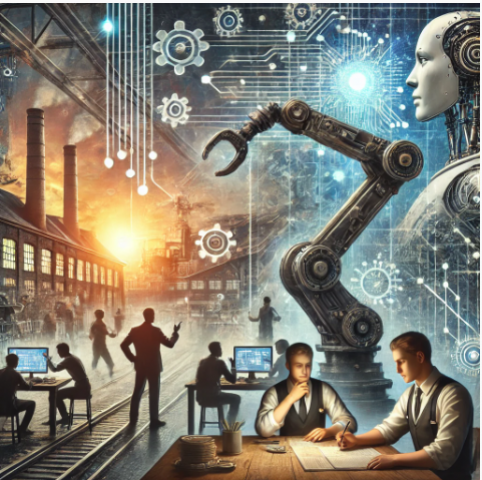From physical strength to mental agility: AI's impact on human labour
As Artificial Intelligence begins to handle routine cognitive tasks, concept of 'mental gyms' becoming a reality

For much of human history, physical fitness was not a choice but a necessity. Daily tasks like farming, construction, and other forms of manual labor kept people strong and active.
Structured exercise routines, gyms, or weightlifting were not needed, as heavy lifting was an integral part of survival. However, this natural demand for physical strength changed drastically with the advent of the Industrial Revolution.
Machines began taking over physically demanding tasks, reducing the need for manual labor and paving the way for the emergence of gyms to compensate for the loss of everyday exertion.
Fast forward to the 21st century, a similar transformation is unfolding—this time in the realm of cognitive labor. Artificial Intelligence (AI) is stepping into tasks once reserved for human intellect.
Jobs like data analysis, pattern recognition, and even decision-making are increasingly being handled by AI. Much like machines replaced physical labor centuries ago, AI is now automating many intellectual tasks, forcing society to reevaluate the role of human intelligence in the modern world.
As AI continues to rapidly advance, its ability to automate tasks based on logic, rote processing, and pattern recognition frees humans from these basic cognitive responsibilities. However, this doesn't render people obsolete. In fact, it highlights the growing need for skills where AI still falls short—creativity, emotional intelligence, and complex problem-solving.
This transition is not unlike the shift from physical labor to intentional exercise in gyms.
In a world where AI manages much of the intellectual "heavy lifting," there is an emerging need for "mental gyms," spaces where individuals can exercise and nurture their creativity, ethical reasoning, and emotional intelligence.
For centuries, human labor depended heavily on tasks requiring general intelligence such as calculation, decision-making, and problem-solving.
But as AI shoulders these cognitive duties, individuals now have the chance to explore dormant skills that set humans apart from machines—creativity, empathy, and ethical judgment.
These abilities are increasingly becoming vital in a world where machines cannot fully replicate the nuances of human experience.
The rise of AI, much like the mechanisation of the Industrial Revolution, signals a profound societal shift. As AI assumes many cognitive responsibilities, the challenge for humanity is not to compete with machines but to focus on what makes us uniquely human.
Nurturing emotional depth, refining creative problem-solving abilities, and fostering a deeper connection with others will be key to thriving in the AI age.
This revolution offers an opportunity to rediscover underutilized aspects of human intelligence.
As AI continues to shape the future of work, the emphasis will likely shift from routine intellectual tasks to creativity, innovation, and emotional depth—qualities that machines have yet to master.


















COMMENTS
Comments are moderated and generally will be posted if they are on-topic and not abusive.
For more information, please see our Comments FAQ